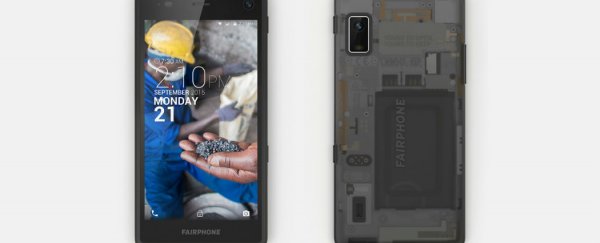A Dutch electronics company has developed a new smartphone that's free from the questionable mining and manufacturing practices that tech giants like Apple and Samsung have found themselves mired in for years. And they say you can fix and upgrade them yourself, which means they'll last a whole lot longer than your typical iPhone.
Having already sold 60,000 Fairphones over the past two years, manufacturer Bas van Abel plans to release a second iteration this year that improves on the life of the device, and is built using fair-trade materials including tantalum, tin, tungsten, and gold ('3TG' collectively).
Smartphones are awesome, but boy, do they leave their mark on the environment; labourers in developing countries; and yes, occasionally our sanity. Each year in the US, around 130 million of them are thrown out, 89 percent of which end up in landfill. Included in this waste is a fair chunk of what's known as 'conflict minerals'.
Conflict minerals are used to produce 3TGs, all of which are important materials for use in the production of smartphones. The problem is that the majority of these minerals are sourced in the Democratic Republic of Congo and a number of war-torn countries that surround it, which allows valuable 3TGs to end up in the hands of violent warlords and militia groups. And then there's the questionable factory labour practices used to construct smartphones in countries like China and Taiwan, the BBC recently reporting that the employees were "treated like prisoners".
While Apple and Samsung are now publicly committed to improving things, Bas van Abel is offering a phone that's 100 percent free from all of that dodginess. Ben Schiller breaks down the best bits of the new version, the Fairphone One, over at Fast Company, saying that while the previous iteration included parts that had been licensed from several manufacuers, Bas van Abel is taking even more control this time around and is designing every aspect of the device itself using 3TGs that have been ethically sourced.
To make the phone more long-lasting than the ones we're used to, the team at Bas van Abel make the guts of it completely accesible, which means the user can get in there and fix a malfunctioning part, instead of throwing the whole thing away. "We made a phone that people can open, so they can change parts themselves. If they can take care of it, they are probably going to use it longer," Van Abel told Schiller.
Yep, that means no more infuriating visits to the Apple Genius Bar every time the tiniest thing goes wrong with your smartphone. Rejoice!
The not-for-profit company donates to the phone recycling company, Closing the Loop, with every Fairphone unit sold, and seems to be genuinely interested in sending a message to the industry, rather than making a fortune. "We want to attract people who understand that you have to be an active player to make something like Fairphone possible," says Van Able. "If we can make fairer products, we can create space for the big guys to scale their ethical business as well."
The Fairphone One will go on sale in Europe later this year, and in 2016 in the States. Good on them, we hope they can make a difference.
